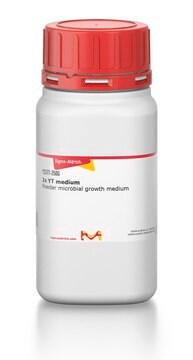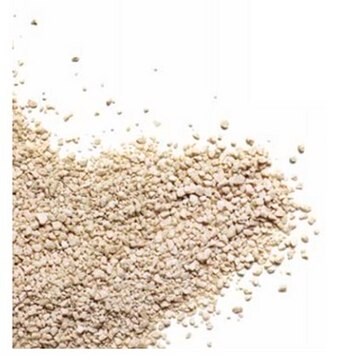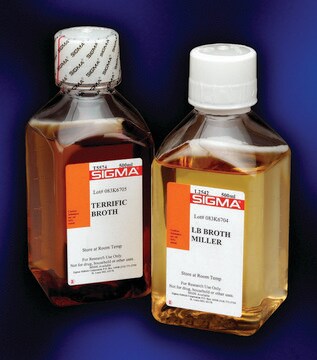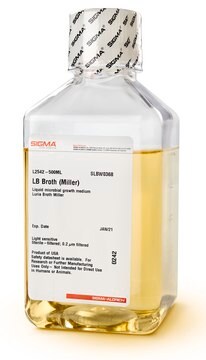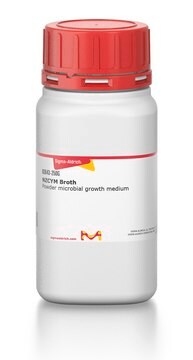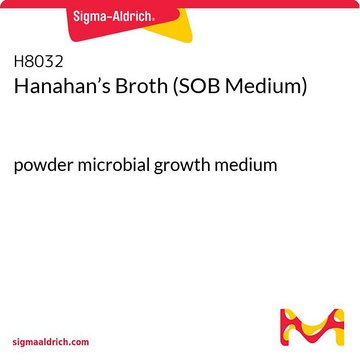T9179
Terrific Broth
EZMix powder microbial growth medium
Synonyme(s) :
TB media
Se connecterpour consulter vos tarifs contractuels et ceux de votre entreprise/organisme
About This Item
Code UNSPSC :
41106200
Nomenclature NACRES :
NA.85
Produits recommandés
Qualité
Molecular Biology
for molecular biology
Niveau de qualité
Description
TB; quick dissolve, dust-free formulation
Stérilité
non-sterile
Forme
powder
Technique(s)
microbiological culture: suitable
Application(s)
agriculture
food and beverages
microbiology
Température de stockage
room temp
Adéquation
nonselective for Escherichia coli
nonselective for coliforms
Description générale
Terrific Broth is a highly-referenced microbial growth medium used for the cultivation of E. coli. This nutrient-rich microbial broth contains glycerol, peptides, amino acids, water-soluble vitamins, and carbohydrates.
Application
Suitable for non-selective cultivation of E. coli strains for cloning, high yield DNA plasmid production and high yield production of recombinant proteins. Also suitable for selective cultivation when appropriate antibiotics are added.
Terrific broth has been used:
Terrific broth has been used:
- as a medium for selective growth of E.coli BL21 (DE3) V2RpRARE expressing MLL SET (nuclear proto-oncogene) domain in pET28GST-LIC
- to grow BL21 (DE3) cells containing plasmid expressing IL-8 (interleukin-8)
- Terrific broth is also suitable for use in bacterial suspension (Bacillus subtilis strain 1085B)
Caractéristiques et avantages
Terrific Broth EZMix powder provides:
- Granulated, dust-free format for safer handling and faster mixing
- A budget-friendly alternative to liquid
- Modified formulation (without glycerol)
- Easy scale-up using larger package sizes
Composants
*Note some of the product sizes available are given in liquid measure. This is a powder format product and those sizes reflect the final reconstituted volume.
23.6g/L Yeast Extract
11.8g/L Tryptone
9.4g/L K2HPO4
2.2g/L KH2PO4
23.6g/L Yeast Extract
11.8g/L Tryptone
9.4g/L K2HPO4
2.2g/L KH2PO4
Reconstitution
Suspend 24.1 g of powder and 4 mL of glycerol in sufficient deionized water to make 500 mL. Autoclave for 15 minutes at 121 °C to sterilize. Allow to cool before making additions, such as antibiotics (if desired).
Informations légales
Produit(s) apparenté(s)
Réf. du produit
Description
Tarif
Code de la classe de stockage
11 - Combustible Solids
Classe de danger pour l'eau (WGK)
WGK 3
Point d'éclair (°F)
Not applicable
Point d'éclair (°C)
Not applicable
Faites votre choix parmi les versions les plus récentes :
Déjà en possession de ce produit ?
Retrouvez la documentation relative aux produits que vous avez récemment achetés dans la Bibliothèque de documents.
Les clients ont également consulté
Eve Toulza et al.
Applied and environmental microbiology, 76(13), 4521-4529 (2010-05-04)
Understanding the conditions leading to harmful algal blooms, especially those produced by toxic dinoflagellate species, is important for environmental and health safety. In addition to investigations into the environmental conditions necessary for the formation of toxic blooms, we postulate that
Idan Tuval et al.
Proceedings of the National Academy of Sciences of the United States of America, 102(7), 2277-2282 (2005-02-09)
Aerobic bacteria often live in thin fluid layers near solid-air-water contact lines, in which the biology of chemotaxis, metabolism, and cell-cell signaling is intimately connected to the physics of buoyancy, diffusion, and mixing. Using the geometry of a sessile drop
Paul Peluso et al.
Analytical biochemistry, 312(2), 113-124 (2003-01-18)
Antibody microarrays have the potential to revolutionize protein expression profiling. The intensity of specific signal produced on a feature of such an array is related to the amount of analyte that is captured from the biological mixture by the immobilized
Optimizing antibody immobilization strategies for the construction of protein microarrays
Peluso P, et al.
Analytical Biochemistry, 312(2), 113-124 (2003)
Cynthia Sanville Millard et al.
Protein expression and purification, 29(2), 311-320 (2003-05-28)
Contemporary approaches to biology often call for the high-throughput production of large amounts of numerous proteins for structural or functional studies. Even with the highly efficient protein expression systems developed in Escherichia coli, production of these proteins is laborious and
Notre équipe de scientifiques dispose d'une expérience dans tous les secteurs de la recherche, notamment en sciences de la vie, science des matériaux, synthèse chimique, chromatographie, analyse et dans de nombreux autres domaines..
Contacter notre Service technique


